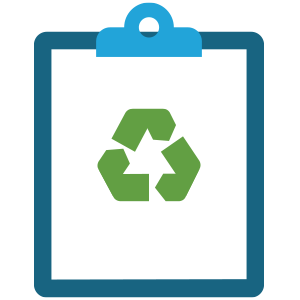Talk to SLS today about our compliant destruction and e-recycling services.
Tip Sheet Recycling
 Evaluate Your E-Recycler Using These 5 Factors
Evaluate Your E-Recycler Using These 5 Factors
There are many electronics recyclers who might not recycle at all – they merely resell valuable equipment and/or export items to developing countries. This can expose your company to a range of data security, environmental and brand reputation liabilities. Here are 5 ways your company can evaluate your e-recycler before you work with them:
- Review their compliance package. Ask for your recycler’s environmental, health and safety policy and verify their procedures. Are their processes governed by standard operating procedures (SOPs)? What security measures are in place to protect your equipment? Do they wipe hard drives to NIST SP 800-88 r1 recommendations prior to resale? Are they a member of the National Association for Information Destruction (NAID)?
- Ensure data security is top priority. The need for data security affects all organizations. Unfortunately, all too often, sensitive information is not secure, particularly upon equipment disposal. Ensure that your recycler is fully up-to-date with their current processes. SLS operates to the highest standards when it comes to data security. Our data wiping services provide peace-of-mind, accountability and assurance that our clients’ privacy and corporate reputation remain intact and eliminates potential compliance risks associated with retired IT assets.
- Discuss on-site and downstream environmental management. Your recycler must manage your environmental exposure both on and off-site. Ask and identify where and how materials of concern such as batteries, CRT glass, and mercury bulbs are removed and stored. Is there an Environmental Manager whose primary responsibility is ensuring compliance? Off-site your recycler must conduct site audits of their downstream processors, especially for these materials of concern.
- Review capacity and capabilities. Electronics are manufactured from plastics, metals, glass and precious metals. Advanced recycling requires large, expensive equipment which separates the different materials from each other. The “product” produced from recycling is clean separated streams of recycled plastic, iron, steel, copper, aluminum, glass and precious metals. The better these materials are separated, the more ways these commodities can be used to make next generation products. Advanced separation is critical in developing closed loop solutions which reduce pollution and carbon emissions, reduce energy and water consumption and keep useful materials out of landfills. An advanced recycling line can cost between $7M to $14M, depending upon its complexity. If your recycler says they handle 40M lbs per year, they’ll need a site of around 150,000 sq ft and around 100-150 staff.
- Conduct a thorough audit. For the protection of your company and clients, it is recommended that you audit your recycler thoroughly. This will help prevent the risk of confidential data such as credit card information, Social Security Numbers, medical records, or the negative impact to your company’s brand and reputation if their equipment is found dumped in Asia or Africa.